What an academic year.
The 2019–2020 term, which never had its proper goodbyes, was a series of testifying unpredictable events. Filled with milestones, but plagued by crises, this year was truly unforgettable.
And now, as we continue to grapple with our new realities with COVID-19 and avoid thoughts about the future, a little comfort can be found in reminiscing over the past. Perhaps this will be the final goodbye that the 2019–2020 academic year needs and the start to the future school year ahead of us.
September
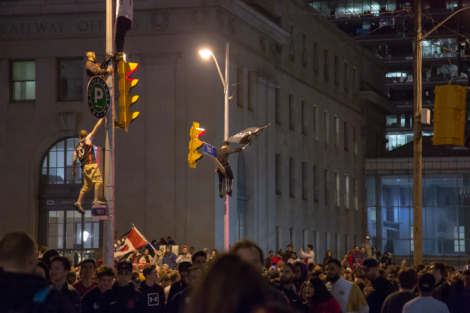
Toronto celebrating the Raptors win. DINA DONG/THE VARSITY
The fall term rolled in on a patriotic high from the Raptors’ NBA championship celebrations. Everyone living in Toronto suddenly became a Raptors fan and celebrated the historic moment — including students at the University of Toronto.
The engineers commemorated the historic win by painting the Raptors logo onto the University of Toronto Students’ Union (UTSU) dome, one of the many traditions of the engineering faculty’s F!rosh Week. Not all traditions last, however. This year, the engineers were advised against dyeing themselves purple due to health concerns. Despite this marking the end of the iconic orientation activity, they did not let it dampen the mood of orientation week.
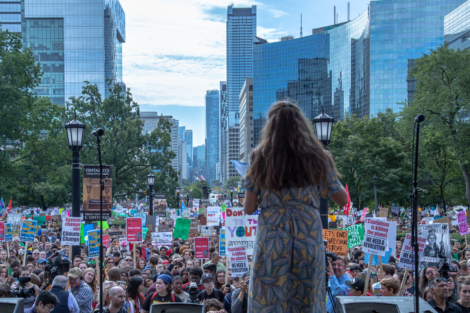
Global Climate Strike rally in Toronto. DINA DONG/THE VARSITY
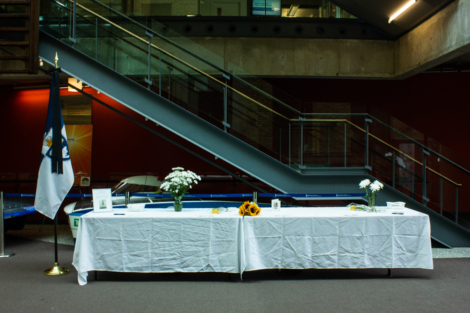
Bahen building at U of T. JOSIE KAO/THE VARSITY
As the excitement of the first month of the term trickled away, September came to an anguished end. When another student took their life in the Bahen Centre for Information Technology, the U of T community joined forces together, again, to demand that the university address the ongoing mental health crisis. People held protests; student groups like U of Thrive formed, and students demanded change from the administration.
October
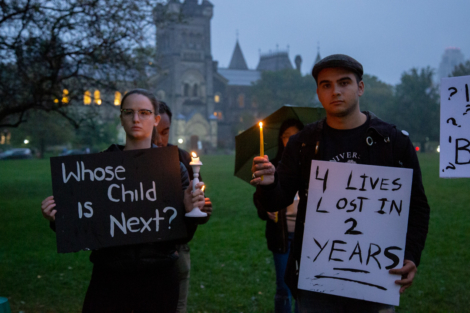
Students participated in a vigil following the protests at the Academic Board. DINA DONG/THE VARSITY
The first week of October echoed September, as U of T students hosted a candlelit vigil outside of Simcoe Hall during the commencement of an Academic Board meeting, commemorating the loss of the student and pushing the university to start taking the mental health crisis seriously.
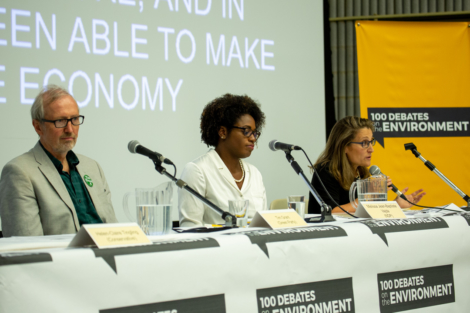
From left to right: Green’s Tim Grant, NDP’s Melissa Jean-Baptiste Vajda, and Liberal Chrystia Freeland. DINA DONG/THE VARSITY
Other events from September also seeped into October. The momentum from the global climate strike was the point of conversation in politics in the context of the federal election on campus. Not long after Prime Minister Justin Trudeau’s announcement of his platform at UTM in September, the UTSU hosted a debate on the environment for the University–Rosedale candidates. Voting became part of our daily routine.
November
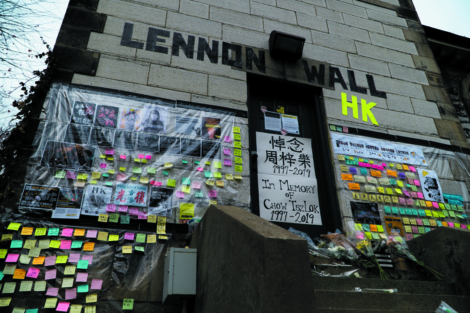
The Lennon wall erected at U of T. SAMANTHA YAO/THE VARSITY
The surprise of an early November snowfall didn’t stop students from being active. Social fragility and unrest in Hong Kong made its way to U of T, where, after a month of protesting, pro-Hong Kong student groups created their very own Lennon Wall on the side of the UTSU building.
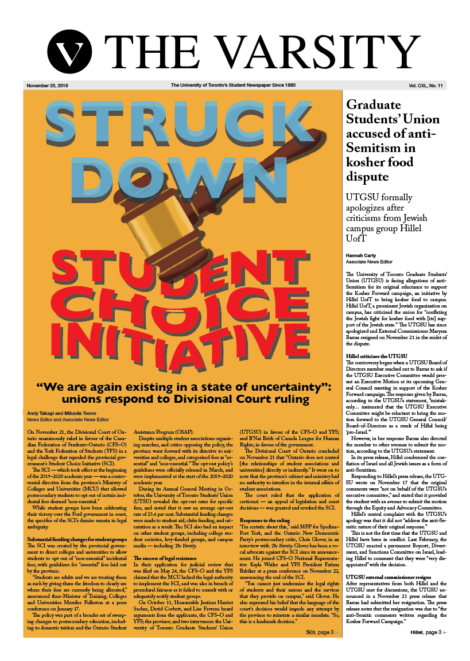
The Varsity’s Cover for the Student Choice Initiative. JULIE SHI/THE VARSITY
Sadly, not all student groups were as active as they normally would have been. With the cuts in funding that resulted from the provincial government’s Student Choice Initiative (SCI), student groups battled with and adjusted to the setbacks.
An unexpected turn of events saw the SCI come to an end, thanks to the hard work of the Canadian Federation of Students–Ontario and the York Federation of Students, who fought a lengthy legal battle that resulted in the Divisional Court of Ontario ruling against the provincial government, and striking down the SCI.
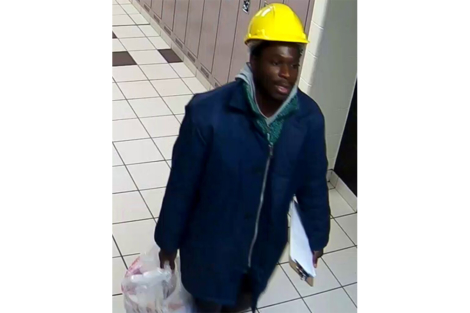
Photo of the suspect. COURTESY OF TORONTO POLICE SERVICE
Not all surprises are pleasant, however. This year Toronto had a peculiar series of crimes in which a man was caught tossing liquified fecal matter onto students. Two of his attacks were on U of T property: one inside Robarts Library, and the other by University Street and College Street. Shortly after his last attack, he was caught by the police, but the damage had already been done — for some, campus would never feel the same.
December
Aside from the usual humdrum of exam season, December was a rather quiet month, ending the 2019 year softly.
January
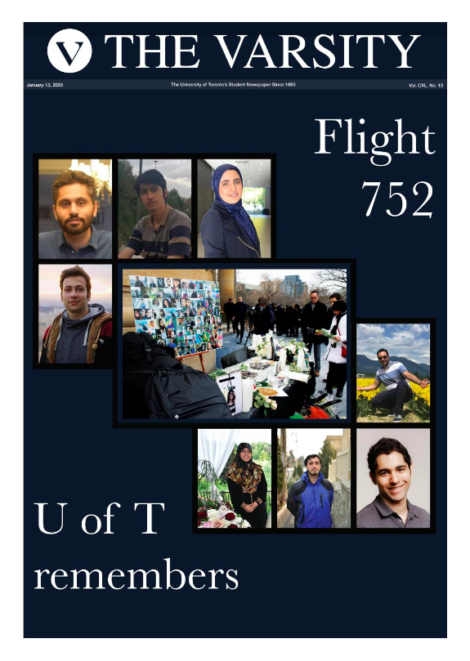
TOP LEFT TO BOTTOM RIGHT: Amin Jebelli/Facebook, Mohammad Amin Beiruti/LinkedIn, Zeynab Asadi Lari/Courtesy of UTM STEM Fellowship/Facebook, Mohammad Asadi Lari/Courtesy of UTM STEM Fellowship/Facebook, HANNAH CARTY/THE VARSITY, Mohammad Mahdi Elyasi/Facebook, Mohammad Saleheh/Courtesy of Seyed Hossein, Zahra Hasani/Courtesy of Seyed Hossein, and Mojtaba Abbasnezhad/Facebook.
While 2020 was filled with high prospects, the month of January opened the winter term on a sombre note. Amidst political tensions between the US and Iran, Ukraine International Airlines Flight 752 was mistakenly shot down, and eight out of the 176 deaths were members of the U of T community. A memorial service was hosted at the Multi-Faith Centre to commemorate the innocent lives caught in a political squabble.
While the first month of the decade was focused on the fears of an outbreak of war, the silent killer, virus COVID-19, slowly made its way into campus life. U of T students abroad in Wuhan were put into quarantine, and some cancelled their semester as they adjusted to the then epidemic that had yet to make its way across the world. But before patient zero made its way into Canada, campus was already different for those of Asian descent, facing discrimination from those around them in fear of the virus.
February

U of T Bookstore selling masks. COURTESY OF ABED2341/REDDIT
By the second month of the winter term, COVID-19 was on the minds of students on campus. Not yet declared a pandemic and only a “global health emergency,” many students did not view the situation as immediately pressing, though there was a surge in demand for masks. The U of T bookstore responded by selling masks at above-market prices, but later apologized for its insensitivity. Student groups such as the Chinese Undergraduate Association responded to the student concerns by handing out free surgical masks. The silent virus was slowly making its presence more known in Toronto.

U of T’s toboggan team won first place in race. MICHAEL PHOON/THE VARSITY
On a lighter note beyond the unfortunate events of the first half of winter term, U of T’s concrete toboggan team came in first place at the annual Great Northern Concrete Toboggan Race — which was hosted in Toronto for the first time — the largest and oldest undergraduate engineering competition in Canada.
March
Though we did not know it would be the last, March became the final in-person month of the 2019–2020 academic year. Nonetheless, the month was filled with great celebrations before we went into pandemic mode.
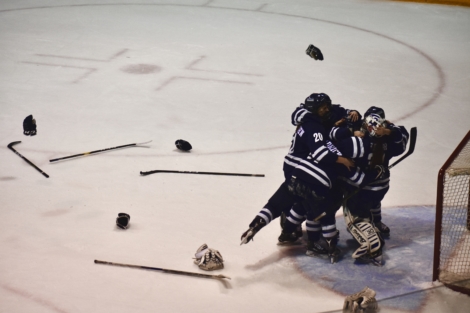
McCaw cup final. NICOLE GIEBLER/THE VARSITY
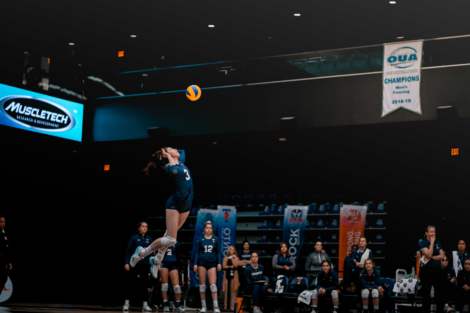
U of T women’s volleyball team. NATHAN CHING/THE VARSITY
While the university scrambled to develop a pandemic response for the remaining semester, the Varsity Blues women’s hockey team won the McCaw Cup and the women’s volleyball team reclaimed their championship title, all during the same week as International Women’s Day.
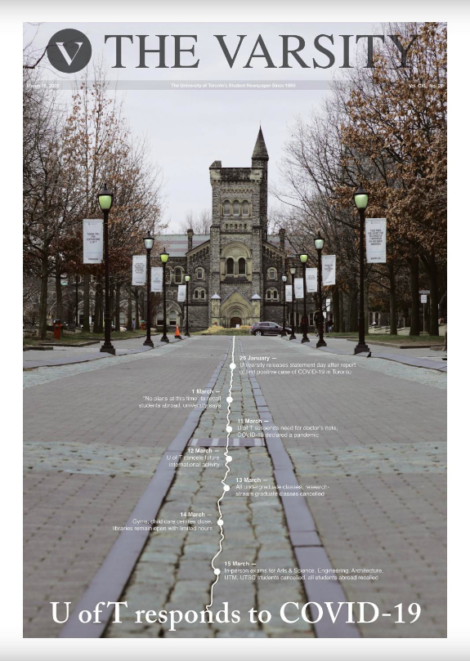
The Varsity’s cover for U of T’s response to COVID-19. DINA DONG/THE VARSITY
Then, on March 13, the university cancelled all in-person classes and made the decision to move online. It was the last of the university we saw. Students were evicted from residence; students abroad were repatriated, and convocation became a virtual celebration. March moved quickly, but the time passed by slowly.
April
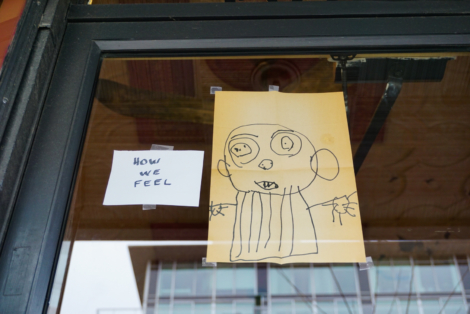
A window at Balfour Books. JADINE NGAN/THE VARSITY
Despite daily emails from deans helping us keep track of the dates, timelessness became an eternal sensation, but it also became an enemy. Before students could process the pandemic and while professors were still adjusting to the virtual methods of teaching, virtual exams came crashing down. Some classes changed their marking schemes while others didn’t, but it was not enough time for everyone to accept what seemed like a temporary change in our lifestyles.
May
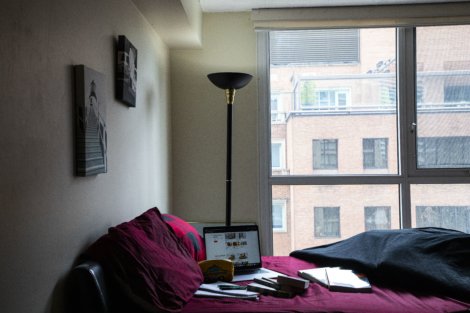
Michael’s Toronto apartment, where he’s spending lockdown. MICHAEL PHOON/THE VARSITY
Regardless of the rapid changes, we carried on, and with the simple press of a power button, the 2019–2020 academic year logged off. The 2020–2021 academic school year started with a bright LED screen, a muted microphone, and a turned off camera. Summer classes went completely virtual.
June
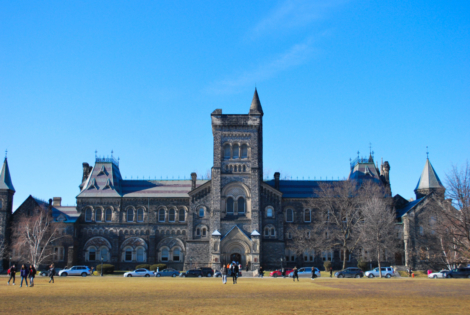
U of T front campus. JADINE NGAN/THE VARSITY
By June, it had been months since the university moved online, and we were expecting the fall term to become a hybrid version of both virtual and in-person sessions. But we recognized that it would not feel the same, something the graduating class of 2020 can vouch for. Although there was a celebration, the online convocation could not replicate or capture the essence of graduating, a final goodbye to labouring years invested in education.
Yet we saw that this could be the new reality for future generations to come as we continue to fight the pandemic. As we slowly started to enter stages that reopened Toronto, one thing was for sure — we may never return back to what we once called normal.
That is not a negative thing, however, as this presents an opportunity for new normals to emerge. With the whole world on pause, new channels have emerged for us to enact change that may not have been possible before.
The month of June has proven that to be true. The murder of George Floyd by police officers in Minnesota sparked an international response to the mistreatment and racism that Black communities face across the world. People took to the streets, marching for justice, for those wrongfully murdered at the hands of police, and for the dismantlement of white supremacy.
Canadians too have been demanding justice as we marched for Regis Korchinski-Paquet, a young and vibrant Afro-Indigenous member of the Toronto community who died after the police came to her home on a call for a domestic incident.
The Minneapolis protests have proven that activism can instigate change, as the Minneapolis City Council pledged to dismantle the police department.
The University of Toronto has also been confronted for its own anti-Black racism. For instance, three Black students students recently wrote an op-ed on Trinity College’s inability to resolve the racist community it cultivates. A petition has been circulating online calling for concrete action on the administration’s part.
What has been set in stone is that students are challenging the injustices that Canada and its institutions have committed against the Black and Indigenous communities — injustices that are still happening. If there’s anything we’ve learned from this month so far, it’s this: we have the ability to change the future.
July and beyond
July continued to push us into these new normals. A scramble for course enrollment, presented in both online and in-person, forced students to realize that the pandemic cannot continue to put our lives on hold. Yet even though as Toronto further re-opened, the dangers of the pandemic still lingers, causing some to petition for a completely virtual fall term. Despite these drastic changes and limitations, and calls for financial relief form students, U of T tuition did not change.
As we rolled into August, disputes for the fall term have continued and changes have occurred almost daily. But just as we have in the previous months, we will adapt to our new normals, our new lifestyles, and our new routines.
The 2019–2020 academic year proved the strength of U of T students, and our ability to thrive despite multiple crises. And while we wait for the future, we can reflect on our past, learn from it and act on it, because if there’s anything that the 2019–2020 academic year taught us, it’s that hindsight is truly 20/20.
I’ll see you online.


